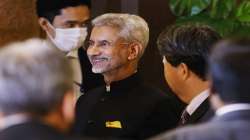It's in mutual interest of India and China to find way to accommodate each other: Jaishankar in US
S Jaishankar, who is in US to attend the annual UN General Assembly session, made the remarks while replying to a question on the rise of China and India amidst their border standoff during his interaction with the audience at the Columbia University.

UNGA 2022: External Affairs Minister S Jaishankar said on Wednesday that it is in the mutual interest of India and China to find a way to accommodate each other because if they failed to do so, it would affect the rise of Asia, which is contingent on the biggest economies of the continent getting along with each other.
Jaishankar, who is here to attend the annual UN General Assembly session, made the remarks while replying to a question on the rise of China and India amidst their border standoff during his interaction with the audience at the Columbia University.
"In our times, the biggest change we have seen in the world is the rise of China," he said, adding that China has risen faster than India, (and) more dramatically in the same time span.
"The issue for us today is how the two rising powers, in absolute proximity to each other, find a modus vivendi in a dynamic situation," he said.
"It is in our mutual interest that we find a way of accommodating each other," he said, adding that the rise of Asia is contingent on the biggest economies of Asia getting along with each.
Responding to a question whether China can open a consulate in Chennai, the minister said, "at this point of time, India's relations with China is not normal."
His remarks came a week after Indian and Chinese armies carried out a joint verification of the disengagement process at PP-15 in the Gogra-Hotsprings area in eastern Ladakh after withdrawing their troops and dismantling temporary infrastructure from the friction point in the mid of this month.
The eastern Ladakh border standoff erupted on May 5, 2020, following a violent clash in the Pangong lake areas. Both sides gradually enhanced their deployment by rushing in tens of thousands of soldiers and heavy weaponry.
As a result of a series of military and diplomatic talks, the two sides completed the disengagement process last year on the north and south banks of the Pangong lake and in the Gogra area.
The disengagement in the Pangong Lake area took place in February last year while the withdrawal of troops and equipment in Patrolling Point 17 (A) in Gogra took place in August last year.
Last month, Jaishankar had said in Bangkok that the relationship between India and China is going through an "extremely difficult phase" after what Beijing has done at the border and emphasised that the Asian Century will not happen if the two neighbours could not join hands.
Responding to a question, Jaishankar had said that the Asian Century will happen when China and India come together but the Asian Century will be difficult to happen if India and China could not come together.
ALSO READ | Putin announces partial mobilization for Russian citizens, threatens enemies
ALSO READ | Mob protests amid 'Allahu Akbar' chants outside Durga Bhawan Temple in UK's Smethwick